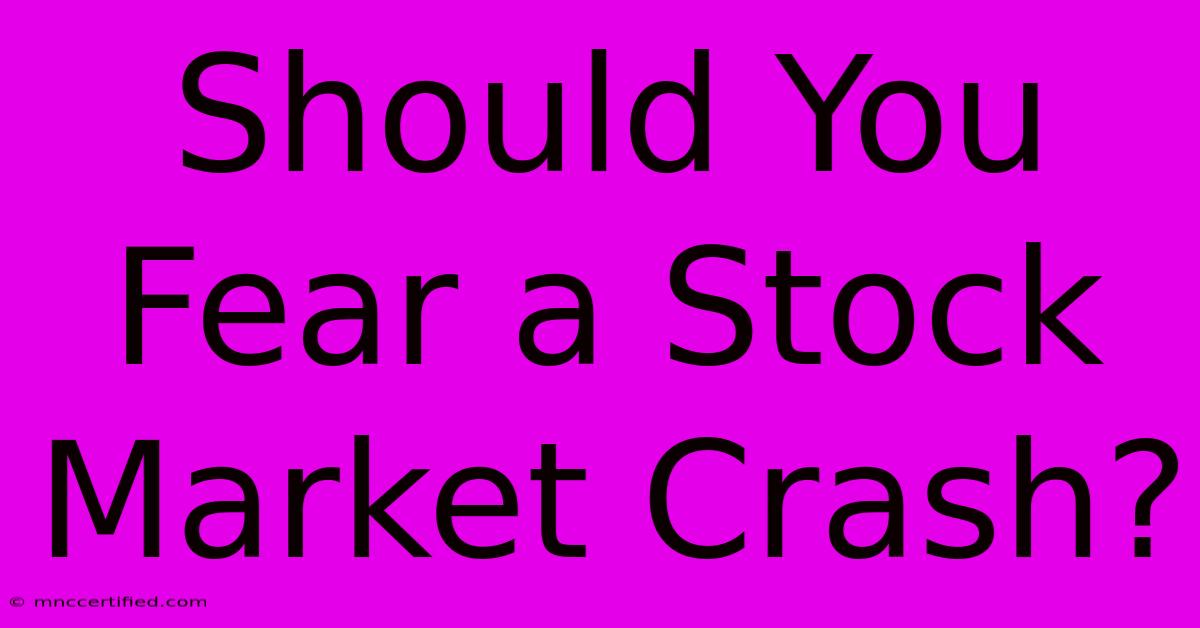Should You Fear A Stock Market Crash?

Table of Contents
Should You Fear a Stock Market Crash? A Guide to Navigating Market Volatility
The stock market's inherent volatility often sparks fear, especially when whispers of an impending crash circulate. But should you genuinely fear a stock market crash? The answer is nuanced and depends largely on your individual circumstances, investment strategy, and risk tolerance. This comprehensive guide will help you understand market crashes, assess your personal risk, and develop a strategy to navigate market downturns.
Understanding Stock Market Crashes: What Are They and Why Do They Happen?
A stock market crash is a significant and rapid decline in stock prices across a broad market index. These crashes aren't isolated events; throughout history, markets have experienced periodic corrections and crashes driven by various factors:
-
Economic Recessions: Recessions, characterized by declining economic activity, often trigger market crashes as investors react to reduced corporate profits and increased uncertainty. The 2008 financial crisis is a prime example.
-
Geopolitical Events: Major global events, such as wars, political instability, or terrorist attacks, can severely impact investor confidence, leading to market declines.
-
Inflationary Pressures: High and persistent inflation erodes purchasing power and can lead to central bank intervention (like raising interest rates), negatively impacting stock valuations.
-
Market Bubbles and Speculation: Periods of excessive speculation and inflated asset prices (bubbles) are often followed by sharp corrections when the bubble bursts. The dot-com bubble of the late 1990s is a classic example.
-
Unexpected Events (Black Swan Events): Unforeseeable events with significant market consequences, like the COVID-19 pandemic, can trigger sudden and dramatic drops.
Assessing Your Personal Risk: Are You Vulnerable to a Market Crash?
Before addressing the fear itself, honestly assess your personal vulnerability:
-
Investment Timeline: Long-term investors (those investing for retirement, for example) are generally less susceptible to short-term market fluctuations. Market crashes, while painful in the short term, historically recover over the long run. Short-term investors, however, are more exposed to losses during a crash.
-
Investment Portfolio Diversification: A well-diversified portfolio, spread across different asset classes (stocks, bonds, real estate, etc.), mitigates risk. Over-reliance on a single stock or sector increases vulnerability.
-
Debt Levels: High levels of personal debt (credit card debt, mortgages) can exacerbate the impact of a market crash, as income may decrease while debt obligations remain.
-
Emergency Fund: A robust emergency fund (3-6 months of living expenses) provides a financial safety net during economic downturns, preventing panic selling.
Strategies to Navigate Market Volatility: Managing Your Fear
Fear is a natural human emotion, but it shouldn't dictate your investment decisions. Here are strategies to manage your fear and navigate potential market crashes:
-
Maintain a Long-Term Perspective: Focus on your long-term financial goals and avoid making impulsive decisions based on short-term market fluctuations. Remember that market crashes are temporary.
-
Diversify Your Portfolio: Spread your investments across various asset classes to reduce the impact of any single market downturn.
-
Dollar-Cost Averaging: Invest a fixed amount regularly, regardless of market conditions. This strategy reduces the impact of buying high and selling low.
-
Rebalance Your Portfolio Regularly: Periodically rebalance your portfolio to maintain your desired asset allocation, taking advantage of market downturns to buy low.
-
Avoid Panic Selling: Resist the urge to sell your investments during a market crash. Panic selling often locks in losses.
-
Seek Professional Financial Advice: Consult a qualified financial advisor to develop a personalized investment strategy tailored to your risk tolerance and financial goals.
Is Fear Always a Bad Thing? The Benefits of Healthy Caution
While excessive fear can lead to poor investment decisions, healthy caution is crucial. Fear can act as a warning signal, prompting you to reassess your risk exposure and make necessary adjustments to your portfolio. It encourages responsible investing and careful planning.
Conclusion: Embrace Informed Decision-Making, Not Fear
A stock market crash is a possibility, but it shouldn't paralyze you with fear. By understanding the factors that contribute to market crashes, assessing your personal risk, and implementing sound investment strategies, you can navigate market volatility effectively. Remember that informed decision-making, based on a clear understanding of your financial situation and investment goals, is far more valuable than letting fear dictate your actions. Focus on the long term, diversify wisely, and stay informed – this is a far more effective approach than succumbing to panic.

Thank you for visiting our website wich cover about Should You Fear A Stock Market Crash?. We hope the information provided has been useful to you. Feel free to contact us if you have any questions or need further assistance. See you next time and dont miss to bookmark.
Featured Posts
-
Cavutos Farewell Leaving Fox News
Dec 20, 2024
-
Towns Receives Knicks Ovation Watch
Dec 20, 2024
-
Chelsea Vs Shamrock Uefa Live Score
Dec 20, 2024
-
Chelsea Vs Shamrock Rovers Conference League Result
Dec 20, 2024
-
Dow Jones Today Recovery From Sell Off
Dec 20, 2024